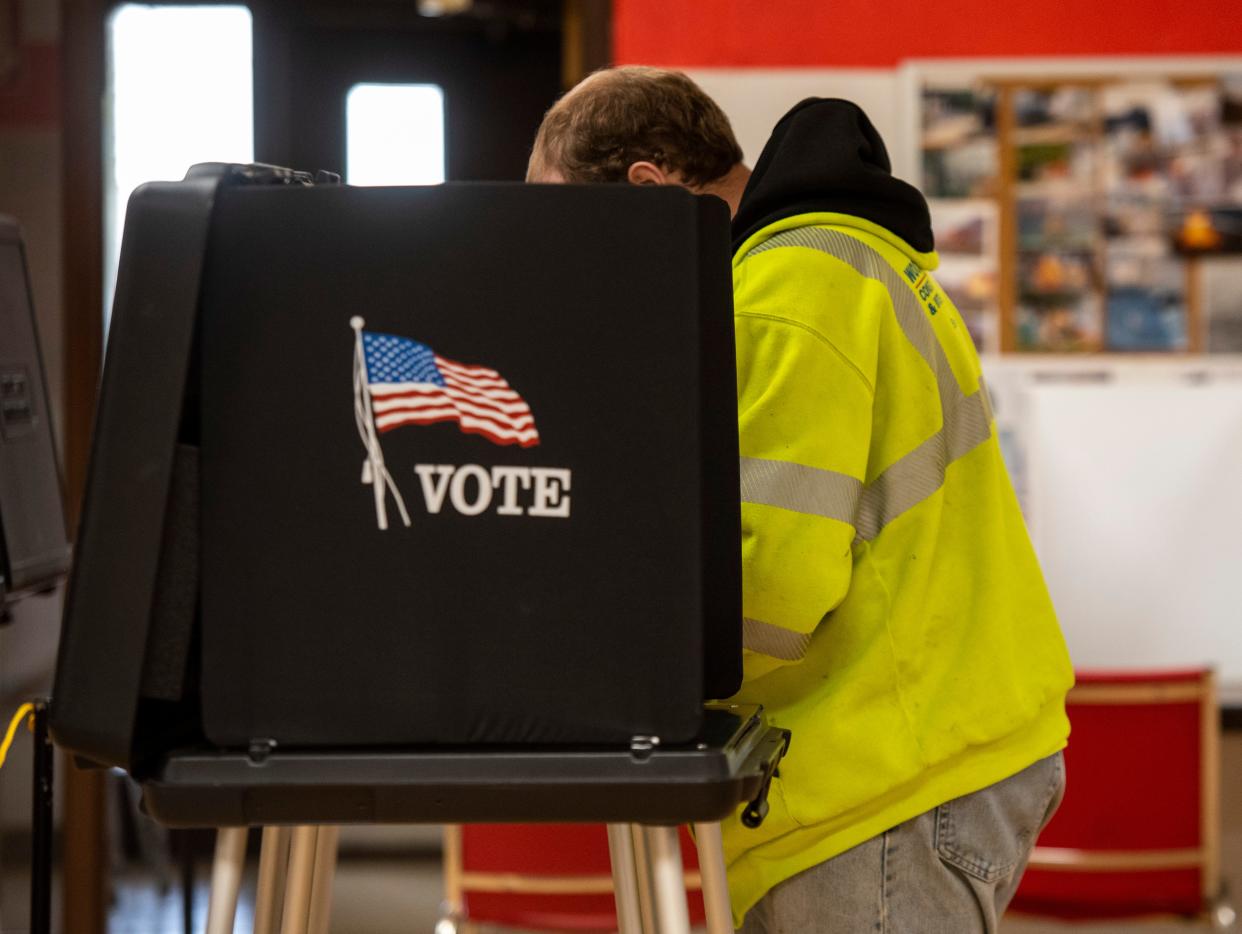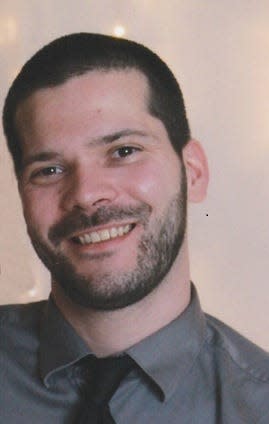Meet the candidates: Who is running for Marine City Commission?

Five candidates are vying for three open seats on the Marine City Commission in November’s election — each with varying priorities along a narrative divide that’s recently dominated the debate in local politics.
Incumbent Commissioners Jacob Bryson and John Kreidler are running to retain their seats.
Challenging them are Mike Hilferink, a returning candidate and frequent public commenter, Rita Roehrig, a newcomer whose sister is a sitting city commissioner, and Andrew Pakledinaz, a new resident already serving with the city’s planning commission, among other groups.
Mayor Cheryl Vercammen and Commissioner Wendy Kellehan, whose terms are up, are not running for re-election. Jennifer Vandenbossche is running unopposed for mayor.
Most of this year’s commission candidates said they wanted to address the city’s crumbling roads. And all of the candidates shared a hope to help the city flourish. But they had different ideas or methods — the kind that answer who they thought the city is for — to accomplish that goal.
Bryson: 'There's always room for improvement'
For Bryson, infrastructure was both an accomplishment over the last four years of his first term and a priority for the next, if elected.
He pointed to one large underground water and sewer line project and a dozen road resurfacing projects that are already done, as well as several more addressed by city commissioners last Thursday. Moving forward, he hoped to keep pushing things in that direction.
“It’s always kind of been number one on my list,” Bryson said. “Everyone wants roads they can drive on without having to go to the dentist afterward. Everyone wants fresh water to drink and toilets that flush.”
Vice president for Champion’s Auto Ferry in Clay Township, a marine compony historically operated by his family, Bryson has had other engineering positions and served on Marine City’s planning commission and infrastructure committee prior to this first term. He is also currently mayor pro tem.
In addition to roads, he pointed to taking steps to sell the former Guy Center, which had previously served as the city’s offices at 303 S. Water, among other city properties, as another positive effort from city commissioners because “I was extremely happy with the process.”
Still, he said he understood not everyone would agree, citing it as an example of how “there’s always room for improvement” in how controversial decisions are made in the city.
Bryson also said he hoped to bolster code and building enforcement, returning to a capacity to do rental inspections, and perform a comprehensive review of city ordinances to make sure they’re unambiguous, clear, and enforceable.
“Most of them are probably fine,” he said of the latter. “But I want to make sure most of them aren’t outdated. There are some that probably need to go away because they’ve been on the books so long. Some of them are poorly worded. Some of them may not conform with current state law.”

Hilferink: Commissioners 'kind of out of touch with the average person'
After the better part of two decades at 303 S. Water, Marine City’s relocation to a property on South Park Street ended what was once meant to be a temporary occupation of the old Guy Center.
For some officials, the move was practical and a long time coming. But Hilferink said he didn’t think the decision to sell it reflect what most residents wanted — some airing concerns to officials that it should’ve stayed in city hands and used to benefit the public. It was something he thought flew in contrast to the past precedent of the city acquiring waterfront property to “give back to the people,” he said.
It was also an example of why he thought the City Commission needed new blood.
“We’ve got engineers up there. We’ve got business owners up there. I think a lot of them are kind of out of touch with the average person,” Hilferink said. “Because of that, people have lost a lot of trust and faith in this commission. Just because simply, they don’t feel their thoughts and concerns are even being respected by the people out there.”
As a candidate, Hilferink, who runs his own e-commerce company and substitute teaches, similarly expressed the point in 2018 when he last ran for a seat.
Other things like roads and more transparency were also areas he elevated to be among his chief priorities.
The rest, Hilferink said, was a matter of how commissioners balance their decisions — be they to accommodate current residents or attract visitors. Amid discussions to use American Rescue Plan funds to expand bike paths, he questioned the need.
“Bike paths are great. We’ve kind of already got one. But how much does a bike path actually help people who already live here?” he said. “People have been talking about wanting a splash pad type of thing like Algonac’s got. Or even like a skate park, which most cities have and somehow we don’t. Those concerns really haven’t been respected. A lot of the ideas that this current commission and city manager have are catered to tourists.”
Kreidler: Make Marine City more safe, walkable for all
A freelance production technician in entertainment and events, things slowed down work-wise for Kreidler when the pandemic hit. He had more time, and after Vercammen became mayor two years ago, he was appointed to replace her on the commission.
Although he’s since returned to traveling for work — meaning a few absences from meetings — he said he’s now hoping to continue to serve the city into a full term.
A lot of that, Kreidler said, meant supporting city efforts that capitalize on its assets.
He’s an advocate for solutions that help make cities more walkable after decades of growth in communities that have often catered more to cars.
“Marine City has not succumbed to all that yet. There’ still corner stores here and there,” Kreidler said. “… So, my ideas are keeping mixed-zoning alive and making it so you don’t have to go 10 miles.”
He pointed to the city’s recent discussion about implementing a road diet on M-29. Unlike in Port Huron or St. Clair, where the state highway goes through downtowns, Marine City’s downtown on Water Street is more insulated, while the highway heads down South Parker.
Road diets traditionally reconfigure and lessen the number of lanes to slow traffic. Kreidler said it may be a good idea.
“I think making it a destination and not a through station makes you think about things like lowering the speed limit significantly,” he said. “Because right now at 35 miles an hour, there’s some crosswalks across Parker Street that nobody uses.”
Something like advocating for a trolley was another example.
“I’m trying to kind of push that,” Kreidler said. “I think it’s worth trying to do because it’ll make the city safer in the long run for kids, grandkids, all that, and as well as make it a destination for tourism.”
Despite some decisions that have been controversial, Kreidler said he didn’t see the narrative, often pitting businesses against residents, the same way. And he said he thought he could contribute to the diversity of talent and ideas to help overcome disagreements and misunderstandings.
“I see it as we can work through these things and kind of help each other see what others might not,” he said. “You know, what’s the consequences, intended or unintended, of these ideas?”
Pakledinaz: Shift focus from Water Street to revitalizing South Parker
Pakledinaz moved to town within the last couple of years.
Despite that, he said he quickly found the appetite to get involved, attending meetings and joining the planning commission and 300 Broadway committee to help preserve the historic city hall building.
Pakledinaz, who works as a detailer with AutoCAD, a computer software agency, said he would support common priorities among residents like roads or finding funds for a splash pad.
But he said he didn’t feel the need to exclusively champion them.
And it was his status as a newcomer and skills as a middleman that, Pakledinaz said, he thought would make him a good pick to join the city’s main elected board after seeing “some fireworks” erupt at City Commission meetings.
“I think I could do a pretty good job at maintaining peaceful and even-handed communication between the members and myself,” he said.
More than that, however, Pakledinaz said Marine City was still on an upswing, and he wanted to be a part of it, while also getting “a bit of age representation on the board.”
“I think we finally hit a point where Water Street is pretty well developed, so I think it’s time to focus on what I think is the next major road, which is going to be Parker Street,” Pakledinaz said. “Parker’s sort of taken a hit, ever since I’ve live in town. The big grocery store is gone. So, I think trying to make Parker a priority (would be ideal). ... (That is) where the residents should be getting the services they need, and it’s falling short at the moment.”
That could also mean revitalizing the Kmart Plaza and filling empty storefronts, he said.
Roehrig: Officials 'not doing the right thing' on key decisions
Roehrig spent most of her life around local politics — first with her mom, whose name she shares, and then, with her sister, Lisa Hendrick, a long-time city commissioner.
She’s just never taken a crack at elected office for herself.
But after the board attempted to oust Hendrick, a frequent ‘no’ voter, a year ago, Roehrig credited both commissioners “giving Lisa a hard time and not doing the right thing” with other major decisions as big reasons she wanted to give it try.
“They seem to have their own little agendas. They’re not paying attention to the citizens and listening to what they have to say about things such as the Guy Center, which is a big controversy here,” Roehrig said. “... I just don’t like the way they’re doing a lot of things, spending our money, not doing anything on the roads.”
Currently retired, Roehrig said she’s previously owned her own business, worked at the post office, and traveled to install and train hotel chains on new computer systems.
Like Hilferink, Roehrig said she believed the city manager and commissioners seemed to be more concerned about attracting visitors than aiding “the actual people who live here.”
The road diet discussion, for instance, she said, most people wouldn’t want it. And while she wasn’t against bike paths, she didn’t think the city should be spending thousands more to extend them.
“I don’t see why we need to spend that kind of money on painting lanes and things for bike paths and putting up more signs. We have signs directing people to downtown and everything. I don’t know why we need more,” Roehrig said. “There’s other things we could look into.
“A lot of people talked about they would like the park by the senior center if we could get the property for a good amount. We could get some grants and put a splash pad in. That would be more useful for the community and people who live here.”
Contact Jackie Smith at (810) 989-6270 or jssmith@gannett.com. Follow her on Twitter @Jackie20Smith.
This article originally appeared on Port Huron Times Herald: Meet the candidates: Who is running for Marine City Commission?

